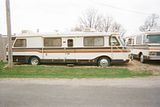 Forums
Forums  General Discussions
General Discussions  A special caution, I received this by email and wanted to share it with everyone
A special caution, I received this by email and wanted to share it with everyoneGo to...  | Start A New Topic  | Search  | Notify  | Tools  | Reply To This Topic  |  |
"First Year of Inception" Membership Club |
I have the senders email but not his name THE LORD WAS WATCHING OVER US Caution to those of us new to the world of RV. Just had my 1974 Barth rebuilt from bumper to bumper and anxious to start out for the Holiday... ( new engine with chrome headers even). The AC pump bearing froze up, the belt broke and took all the other belts with it.. Needless to say we were stranded at the side of the road for the night. It was a cold night and we fired up the furnace... ( all new fire alarms) Nope didn't know to have a combustion air alarm... Sleeping next to an opened window, the wife woke up sick and had a hard time getting out of bed and waking me up.. I knew she was trying but I couldn't get myself to move... We both made it to the door and fought to keep each other moving . After several hours of recovery and later talking to other people we know it was propane poisoning and we are lucky to be alive.. ( many horrible stories). I had the vehicle checked for propane leaks...non have been found. After talking with other RV travelers I am going to have the furnace checked for a cracked heat exchanger.. JUST WANTED TO SHARE THIS NEARLY FATAL EXPERIENCE WITH ALL NEW AND OVER ANXIOUS RV TRAVELERS WAITING TO HIT THE ROAD... [This message has been edited by davebowers (edited December 28, 2002).] | ||
|
| The Old Man and No Barth |
Classic symptoms of carbon monoxide poisoning. Cracked furnace heat exchanger is likely, as is a leak, or blockage in furnace exhaust pipe. Remote possibility - fumes blowing in the open window, if furnace is installed under the bed. Good advice for us all - get a CO alarm, and make sure our furnaces are up to snuff. | |||
|
| "First Year of Inception" Membership Club |
Dave I'm glad that you got out of the motor home OK. I took my furnace out and bench tested it and found that the main valve was leaking and it would have a small explosion. I found out that there are no more parts being made for our furnace so I tossed it. I hope to find another relacement furnace. My wife and I use lots of blankets now and don't worry about the furnace. Dennis | |||
|
"First Year of Inception" Membership Club |
I wanted to point out that the subject of this story is not me. I received this email and have the email address but there was no name. We have every conceivable detector operational in our motorhome. We make sure they are working all of the time. | |||
|
Dave, Thanks. Safe and sound (alarms). Good counsel to all. Happy and a prosporus new year! Jim | ||||
|
 |
...and after all these years later I was wondering if this still occurs... or if it does happen now--- why do we not know about it??? _________________________ The 82 MCC {by Barth} is not an rv-- it is a Motor Coach!! | |||
|
Official Barth Junkie |
Any device that burns propane in an enclosed space can be hazardous. If there is a propane leak, it is heavier than air and will sink into low places and basements and can accumulate. If concentration gets high enough any spark could ignite it explosively. If there is no ignition source the propane can continue to concentrate. While propane is not considered toxic, it can suffocate you like any gas if there is not enough oxygen around. Assuming it does not leak and is burned, there are two other problems. Like us, propane devices nead air, to mix with the fuel and burn. Once burned, the exhaust gases should be vented outside the space. The normal product of propane combustion is CO2, which is what we also breathe out. If the mixture is correct and the burner OK you will get just CO2 and water vapor. This is why you can get away with unvented gas stoves and ranges. (They are usually used intermittently and rarely unattended.) OTOH, if there is limited oxygen, then deadly CO is formed. If your exhaust flue is OK you should be able to vent it. This is why proper air supply and exhaust are both critical for safe operation. All of this applies equally to homes and RVs. Propane appliances have been used for about 100 years with great success and safety PROVIDED THEY ARE WELL MAINTAINED! One of the leading causes of non engine fires in RVs has been propane refrigerators. (SEE ABOVE!) I believe the majority are caused by poor maintenance and needed cleanout, wiring checks and regular safety testing. Wood burning stoves have been in use for many hundreds of years and yes, they are a leading cause of home fires. However, with regular chimney cleaning and proper fueling they are quite safe and totally reliable. Neither of these trends have been missed by insurance companies. Many companies charge more for home insurance if you burn wood. They have been leaning on the RV makers for years to steer them away from propane. They are considered politically incorrect to some companies. Given the millions of people who use propane in their homes and RVs, for heating spaces, water and food, I see no reason to believe their use should be avoided. Nothing new, just applied common sense. 1. Be sure your propane appliances are clean and well maintained. 2. Check your chimney/flue often. If you use it daily, not so much. With occasional use, check each time it is used. 3. Be sure you have adequate fresh air for you and the combustion process. 4. Gas detectors are a good idea. Propane detectors should be installed near the floor. CO detectors should be in the open. 5. Inspect tanks and lines often. 9708-M0037-37MM-01 "98" Monarch 37 Spartan MM, 6 spd Allison Cummins 8.3 325+ hp | |||
|
| Powered by Social Strata |
| Please Wait. Your request is being processed... |
|
 Forums
Forums  General Discussions
General Discussions  A special caution, I received this by email and wanted to share it with everyone
A special caution, I received this by email and wanted to share it with everyoneThis website is dedicated to the Barth Custom Coach, their owners and those who admire this American made, quality crafted, motor coach.
We are committed to the history, preservation and restoration of the Barth Custom Coach.
We are committed to the history, preservation and restoration of the Barth Custom Coach.